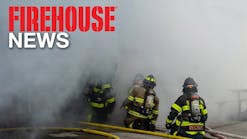Lauderdale, Florida Commissioners Weigh 90% Increase In Fire Fees For Home, Business Owners
If such fees are formally approved for the 2004-05 city budget later this year, property owners now paying a $63 annual fee would get socked with a $119 bill.
For example, the fee could cost the Salvation Army $19,478; it could cost First Baptist Church $21,642.
No other city in Broward County, and very few in the state, charges the fee to nonprofits, according to a city memo.
But commissioners, trying to keep property tax increases to a minimum, have been leaning on fee increases in the past year as the way to bail the city out of its financial difficulties.
In the past year, residents have seen fee increases for fire, sanitation, ambulance transport, water and sewer, parking fines, stormwater, and alarm response. A new fee for people with home alarms was created. Last month, the fire inspection fee was raised.
Commissioner Carlton Moore has opposed the fire fee in the past, saying user fees are a regressive tax that puts a heavier burden on poor people.
"Come on," Moore said Tuesday after the commission meeting. "You know who that's going to hurt the most."
Unlike the property tax, which is lower for people whose homes are worth less, user fees are flat rates that do not take property values into account.
Though final approvals will have to come later in the budgeting process, a majority of commissioners -- Christine Teel, Cindi Hutchinson and Vice Mayor Dean Trantalis -- told interim City Manager Alan Silva he can go ahead and build the budget on the idea that tax-exempt properties must start chipping in for fire service.
They informally agreed the days of breaks are over for social service agencies, government buildings such as those owned by the county or the School Board, cemeteries, mortuaries and other tax-exempt properties, and that everyone else should pay more, as well.
A majority of commissioners -- all but Moore -- also told Silva to create the new budget assuming an 89 percent increase in fire fees on residential homeowners, from $63 to $119 a year.
Small businesses with 20,000 to 29,999 square feet of space would pay $3,975 instead of $2,092.
A larger building, 100,000 square feet or more, like the new Stiles headquarters at 300 SE Second St., would see its $10,459 bill increase to $19,872.
Such increases will require public hearings.
Property owners have seen the fee increase consistently since it was first instituted in 1999 to pay for fire services, traditionally financed with property taxes. Property taxes didn't go down when the fee was instituted, and though it started at $36, the fee was jacked up to $42 and then to $63 before the new $119 recommendation.
Fire Chief Otis Latin urged commissioners to approve the new fees and to start collecting partial assessments for buildings under construction. He wants them to request a payment in lieu of a fee from the Fort Lauderdale Housing Authority, which legally can't be charged the fire fee.
By exempting churches, nonprofits and governments from paying the fire fee, Latin wrote, the city gave up $1 million this year.
"In normal times, this would hardly have been noticed," he wrote. "This year, along with other fiscal shortfalls, it meant layoffs and the periodic taking out of service of Engine 13. There was a significant impact on public safety for not assessing everyone his or her fair share."
Coupled with the proposed fee increase, the new money for the city could total $1.9 million, Silva said.
According to Latin, tax-exempt institutions accounted for 3.8 percent of the fire call volume, a cost of $718,125 in services.
Government properties account for 6.3 percent of fire calls, a cost to the city of $1.2 million, according to Latin.
"The bottom line," he wrote, "is that it costs the city money to provide fire protection service to those entities and that they should be paying, like everyone else, for that service, as authorized by law."





